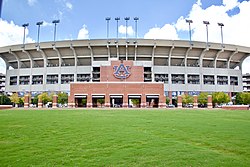 Exterior of the stadium in 2017 | |
| Former names | Auburn Stadium (1939–49) Cliff Hare Stadium (1949–73) |
|---|---|
| Address | 251 South Donahue Drive Auburn United States |
| Location | Auburn, Alabama |
| Coordinates | 32°36′8″N 85°29′21″W / 32.60222°N 85.48917°W |
| Operator | Auburn University |
| Capacity | 88,043 |
| Record attendance | 88,043 (Football; Auburn Tigers vs. Alabama Crimson Tide; November 25, 2023) |
| Surface | Tifway 419 Bermuda Grass |
| Construction | |
| Opened | November 9, 1939[3] |
| Renovated | 2004, 2017 |
| Expanded | 1949, 1955, 1960, 1970, 1980, 1987, 1998, 2000, 2003, 2006, 2007, 2011, 2015, 2018, 2023 |
| Construction cost | $1,446,900 ($31.7 million in 2023 dollars[1]) |
| Architect | Warren, Knight, and Davis[2] |
| General contractor | Murphy Pond/R.M. Construction[2] |
| Tenants | |
| Auburn Tigers (NCAA) (1939–present) Auburn High School Tigers (AHSAA) (1939–1947) Alabama High School Athletic Association (2010–2022) | |
| Website | |
| auburntigers.com/jordan-hare-stadium | |
Pat Dye Field at Jordan-Hare Stadium (properly pronounced as /ˈdʒɜːrdən/ JUR-dən) is an American football stadium in Auburn, Alabama on the campus of Auburn University. It primarily serves as the home venue of the Auburn Tigers football team. The stadium is named for Ralph "Shug" Jordan, who owns the most wins in school history as a head coach, and Cliff Hare, a member of Auburn's first football team as well as Dean of the Auburn University School of Chemistry and President of the Southern Conference. On November 19, 2005, the playing field at the stadium was named in honor of former Auburn coach and athletic director Pat Dye, giving the venue the moniker Pat Dye Field at Jordan-Hare Stadium.
The stadium reached its current seating capacity of 88,043 as of 2023, good for 12th largest among NCAA stadiums, and ranks 13th largest in the country and 21st largest in the world. For years, it has been a fixture on lists of the best collegiate gameday atmospheres and one of the most intimidating places for visiting teams to play.[4][5][6]
- ^ 1634–1699: McCusker, J. J. (1997). How Much Is That in Real Money? A Historical Price Index for Use as a Deflator of Money Values in the Economy of the United States: Addenda et Corrigenda (PDF). American Antiquarian Society. 1700–1799: McCusker, J. J. (1992). How Much Is That in Real Money? A Historical Price Index for Use as a Deflator of Money Values in the Economy of the United States (PDF). American Antiquarian Society. 1800–present: Federal Reserve Bank of Minneapolis. "Consumer Price Index (estimate) 1800–". Retrieved February 29, 2024.
- ^ a b "Jordan–Hare Stadium". Auburn University Libraries. Retrieved September 4, 2012.
- ^ http://shop.ticketluck.com/venues/jordan-hare-stadium-tickets[permanent dead link]
- ^ "SportingNews.com - College Football - No venue more intimidating than Autzen Stadium". Archived from the original on August 18, 2006. Retrieved October 29, 2007.
- ^ "NCAA Football Top 25 college football stadiums - CBS SportsLine.com". sportsline.com. Archived from the original on December 23, 2004.
- ^ "Rivals.com - No place like home".

